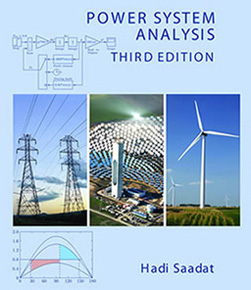
Power System Analysis,
Third Edition
Overview |
New to this Edition |
| Features | Main Topics |
Power System Analysis is designed for senior undergraduate or graduate electrical engineering students studying power system analysis and design. The book gives readers a thorough understanding of the fundamental concepts of power system analysis and their applications to real-world problems. MATLAB and SIMULINK, ideal for power system analysis, are integrated into the text, which enables students to confidently apply the analysis to the solution of large practical power systems with ease.
In the third edition, Chapter 1 is revised comprehensively to include energy resources and their environmental impacts. It covers various fossil-fuel power plants as well as all modern power plants using renewable energy sources. Also, this Chapter includes discussion of the emergence of the smart grid and the role of power electronics in modern power systems. In this edition, programs, functions, and SIMULINK diagrams have been updated to run on the latest version of MATLAB (V7.10, R210a).
Features
The author-developed power system toolbox offers students the opportunity for hands-on
experience in the design and analysis of power systems without the burden of detail
programming. This ready-access toolbox enables the students to confidently apply the
analysis to the solution of large practical power systems. Because of these
features, the book is a superior foundation for further study of power systems and
advanced analyses. The MATLAB M-files on the accompanying diskette can be copied to the user's computer
and used to solve all the examples and the problems at the end of the Chapters. The
toolbox contains numerous interactive functions and practical programs for typical power
system analyses that are designed to work in synergy and communicate with each other
through the use of global variables. The book is distinguished by the emphasis on the integration and implementation of the
computer-aided analysis and design that permeate the entire text. This integrated approach
not only fosters the continued use of the computer throughout the curriculum but supports
the Accreditation Board for Engineering and Technology (ABET) requirements which
specifically call for the use of the computer in the solution of engineering problems. With this book, the files included on diskette, and a suitable computer, users will
find numerous opportunities to apply the techniques presented in solving sophisticated and
large interconnected power systems with ease. Appendices include an introduction to MATLAB, SIMULINK, and an introduction to relevant control system topics.
- The Power System and Electric Power Generation
- Basic Principles
- Generator and Transformer Models; The Per Unit System
- Transmission Line Parameters
- Line Model and performance
- Power Flow Analysis
- Optimal Dispatch of Generation
- Synchronous Machine Transient Analysis
- Balanced Fault
- Symmetrical Component and Unbalanced Fault
- Stability
- Power System Control
- Introduction To MATLAB
- Review of Feedback Control Systems
- Power System Toolbox
- Answers to Problem
- BIBLIOGRAPHY
Top of Page
